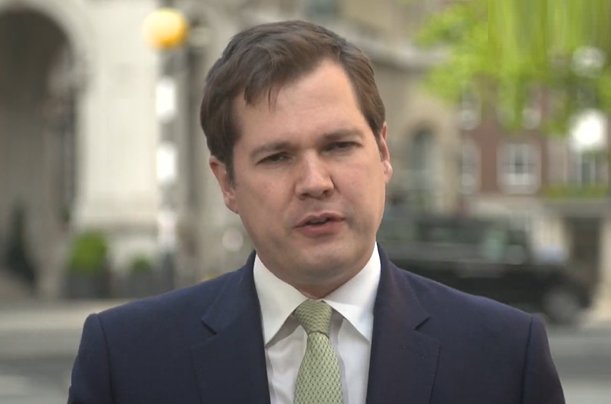Robert Jenrick – Staying at home still ‘very important’
Sophy Ridge began this morning interviewing Communities Secretary Robert Jenrick. The Prime Minister will address the nation at 7pm tonight, updating the government’s Covid-19 strategy, and it is anticipated that he will outline a vision for the end of the lockdown. The official message will change from ‘stay at home’ to the more open-ended ‘stay alert’. Jenrick said that this did not mean the public should expect to see enormous changes in the near future:
RJ: Staying at home will still be a very important part of our message to the public. But people will also need to go to work, they’ll need to go and do essentials… and when they do that, they’ll need to be responsible… We want to give more avenues for people to get out and about so that life can be more liveable… as we move into the next phase.
Covid will get its own ‘threat level’
Jenrick told Ridge that the government would be introducing a new 5-tier ‘threat level’, similar to the kind MI5 use in evaluating the risk from terrorist activity, with a higher number awarded to a greater perceived level of threat. Jenrick outlined the government’s aspirations for the system, and suggested that the scale may also be localised to help contain new outbreaks of the virus if they should arise:
RJ: People will be able to see at what point we are in controlling the virus. At the moment, we believe the country is at ‘4’ on a scale of 5, with ‘5’ being the most concerning. And our aspiration is to bring that down as swiftly as we can to ‘3’… If we see that there are outbreaks in particular localities… we may be able to take particular measures in those places.
Using American testing labs is ‘a contingency plan’
Ridge asked Jenrick about an article in the Sunday Telegraph detailing that as many as 50,000 completed tests for Covid-19 had been sent to the United States due to their inability to be processed in UK laboratories. He confirmed the report was true and that this meant many people had experienced delays in receiving their results:
RJ: There was an issue with one of our labs, and we put in place our contingency plan, which was to take some of the tests to the United States for the testing process, and that was exactly in line with the detailed plans that the Department of Heath had made in advance.
We are ‘passing through the peak’ of care home infections
Covid cases in care homes have been a special concern, because of residents’ particular vulnerability. Jenrick said that he did not know the ‘R’ number (the term for the rate of infections) in care homes, but he was confident that previous problems, which have included care homes admitting infected patients after hospital treatment, would not re-emerge:
RJ: We do believe that [we are] passing through the peak within care homes and that we’re starting to be on a downward trend… We’re putting in place… new discharge policies so that the NHS doesn’t bring people back to care homes unless they’re free of Covid, more personal protective equipment, and ensuring that there is more support… across the country.
Jonathan Ashworth – Lockdown ‘is creating long term heath problems’
Ridge also spoke to the Shadow Health Secretary Jonathan Ashworth about his party’s policy of calling for a ‘roadmap’ out of lockdown. Ashworth said that he still supported the lockdown, but argued that the current situation was unsustainable long-term because of the strains Covid is exacerbating in many other areas:
JA: I am deeply concerned that we are also building up long term illness in our society, because operations have been cancelled, cancer treatments… have been delayed. People are not presenting at A&E [and] unquantifiable mental health problems will be building up… The lockdown is important… but it is creating long term health problems.
Robert Jenrick – I wasn’t involved in briefings to press
Andrew Marr asked Jenrick about a slew of newspaper front pages last week which heavily hinted at substantial changes to the lockdown situation from this Monday. Marr wanted to know if this wave of optimism had come from exaggerated government briefings, resulting in a potentially confusing overall message for people to follow. Jenrick was evasive about this possibility, merely telling Marr that any such messaging had not been down to him:
AM: Did any government briefing contribute to those headlines?
RJ: I don’t know. It’s certainly not something I have been involved in, and I hope not… This will be a cautious approach. There will be no grand re-opening of the economy tonight… We will be setting out the plan, and each milestone will be conditional upon keeping the rate of infection to a manageable level.
There will not be a second Covid app
Marr also asked if the government was considering developing a second contact tracing app after concerns were raised over privacy and potential technical difficulties. The current app, which is being piloted on the Isle of Wight, has been criticised by some for its ‘centralised’ method of collecting data, where the NHS can store the app user’s location in order to obtain information on new Covid hotspots:
RJ: We are learning lessons from the other apps that exist elsewhere in the world and if we need to change our app, we will do… As far as I’m aware we’re not developing a second app.
David Spiegelhalter – Daily press briefing stats are ’embarrassing’
And finally, Professor David Spiegelhalter, the statistician whose expertise has been sought by the SAGE committee, criticised the government’s regular daily press briefings for not communicating statistics in a ‘trustworthy’ way:
DS: I watched yesterday’s, and frankly I found it completely embarrassing. We get told lots of big numbers [but] this is not trustworthy communication of statistics, and it’s such a missed opportunity.






Comments